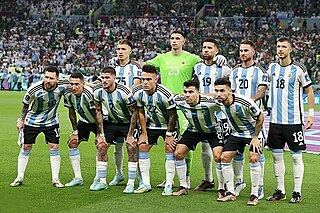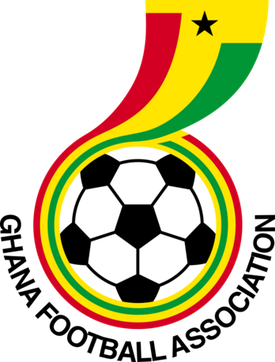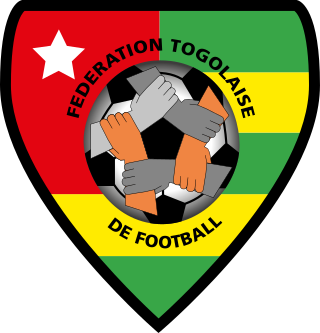Related Research Articles

The FIFA World Cup, often called the World Cup, is an international association football competition among the senior men's national teams of the members of the Fédération Internationale de Football Association (FIFA), the sport's global governing body. The tournament has been held every four years since the inaugural tournament in 1930, with the exception of 1942 and 1946 due to the Second World War. The reigning champions are Argentina, who won their third title at the 2022 tournament by defeating France.

The Africa Cup of Nations, commonly abbreviated as AFCON and officially known as the TotalEnergies Africa Cup of Nations for sponsorship reasons, is the main biennial international men's association football competition in Africa. It is sanctioned by the Confederation of African Football (CAF) and was first held in 1957. Since 1968, it has been held every two years, switching to odd-numbered years in 2013.

The Nigeria national football team represents Nigeria in Men's international football. Governed by the Nigeria Football Federation (NFF), they are three-time Africa Cup of Nations (AFCON) winners, with their most recent title in 2013. In February 2024, the Nigerian national football team was ranked 28th in the FIFA rankings. The team has qualified for six of the last eight FIFA World Cups, missing only the 2006 and 2022 editions. They have reached the round of 16 on three occasions. Their first World Cup appearance was in the 1994 edition. The team is a member of FIFA and Confederation of African Football (CAF).

The Egypt national football team, nicknamed "Pharaohs", represents Egypt in men's international football, and is governed by the Egyptian Football Association (EFA), the governing body of football in Egypt.

The Algeria national football team represents Algeria in men's international football, and is governed by the Algerian Football Federation. The team plays their home matches at the 5 July Stadium in Algiers and Miloud Hadefi Stadium in Oran. Algeria joined FIFA on 1 January 1964, a year and a half after gaining independence. They are the current champions of the FIFA Arab Cup.

The Ghana national football team represents Ghana in men's international football. The team is named the Black Stars after the Black Star of Africa in the flag of Ghana. It is governed by the Ghana Football Association, the governing body for football in Ghana. Prior to 1957, it played as the Gold Coast.

The DR Congo national football team, recognised by FIFA as Congo DR, represents the Democratic Republic of the Congo in men's international football and it is controlled by the Congolese Association Football Federation. They are nicknamed Les Léopards, meaning The Leopards. The team is a member of FIFA and the Confederation of African Football (CAF).

The Ivory Coast national football team represents Ivory Coast in men's international football. Nicknamed the Elephants, the team is managed by the Ivorian Football Federation (FIF). The team has won the Africa Cup of Nations three times, in 1992, 2015 and 2024, and has qualified for the FIFA World Cup three times, in 2006, 2010, and 2014.

The Togo national football team represents Togo in international football and is controlled by the Togolese Football Federation. The national football team of Togo made their debut in the FIFA World Cup in 2006. Their team bus underwent a fatal attack in Angola prior to the 2010 Africa Cup of Nations. They withdrew and were subsequently banned from the following two tournaments by the Confederation of African Football (CAF). In 2013 for the first time in history, Togo reached the quarter-finals of the Africa Cup of Nations. The team represents both FIFA and the Confederation of African Football (CAF).
The Sudan national football team represents Sudan in international football and is controlled by the Sudan Football Association, the governing body for football in Sudan. Its home ground is Khartoum Stadium in the capital Khartoum. In 1957, it was one of the three teams to participate in the inaugural Africa Cup of Nations, the other two being Egypt and Ethiopia.

The Libya national football team represents Libya in men's international association football and it is controlled by the Libyan Football Federation. The team has never qualified for FIFA World Cup but has qualified for editions of the Africa Cup of Nations in 1982, 2006, and 2012. In 1982, the team was both the host and runner-up. In the Arab Cup, Libya finished second in 1964 and 2012, and third in 1966. The team is affiliated with both FIFA and Confederation of African Football (CAF).

The Cape Verde national football team represents Cape Verde in men's international football, and is controlled by the Cape Verdean Football Federation. The team has never qualified for the FIFA World Cup, but has qualified for four Africa Cup of Nations tournaments, in 2013, 2015, 2021 and 2023. The team achieved their best result in 2023 after making it past the first round of the knockout stage.
The Niger national football team represents Niger in international football through the Nigerien Football Federation, a member of Confederation of African Football (CAF). Niger plays in the colors of the flag of Niger, white, green and orange. Their nickname comes from the Dama gazelle, native to Niger, the Hausa name of which is Meyna or Ménas The Dama appears on their badge in the colors of the national flag.

The Chad national football team, nicknamed Les Sao, represents Chad in international football and is controlled by the Chadian Football Federation, the governing body for football in the country. The team has never qualified for the World Cup finals or Africa Cup of Nations. Home matches are played at the Idriss Mahamat Ouya Stadium. In April 2021, FIFA banned the Chad national football team from participating in global football over the Chadian government's interference with the Chadian Football Federation.
Kalusha Bwalya is a Zambian former professional footballer. He is Zambia's eighth-most capped player and third on the list of all-time top goalscorers behind Godfrey Chitalu and Alex Chola. Kalusha was named African Footballer of the Year in 1988 by the magazine France Football and was nominated for the 1996 FIFA World Player of the Year where he was voted the 12th-best player in the world, the first to be nominated after playing the entire year for a non-European club.

Ahmed Hassan Kamel Hussein is an Egyptian former professional footballer who played as an attacking midfielder or on the right wing. He is the fourth most capped international male footballer in history, having made 184 appearances for the Egypt national team. Hassan is regarded as one of the best players in African football history.

The Football Association of Zambia is the governing body of association football in Zambia founded in 1929 and based at the "Football House" on Alick Nkhata Road in Lusaka, the country's capital.

Association football, or soccer, as it is usually called in South Africa, is the nation's most popular sport followed by rugby union and cricket. The governing body is the South African Football Association (SAFA), while the Premier Soccer League is the organisation responsible for running the country's two professional divisions, namely the South African Premiership and the National First Division. The main cup competitions are the Nedbank Cup and the MTN 8 Cup.

On the evening of 27 April 1993, a DHC-5 Buffalo transport aircraft of the Zambian Air Force crashed into the Atlantic Ocean shortly after taking off from Libreville, Gabon. The flight was carrying most of the Zambia national football team to a 1994 FIFA World Cup Qualifier against Senegal in Dakar. All 25 passengers and five crew members were killed. The official investigation concluded that the pilot had shut down the wrong engine following an engine fire. It also found that pilot fatigue and a faulty instrument had contributed to the accident.
Allan Kamwanga is a Zambian former footballer who played as a defender. He played in 35 matches for the Zambia national team from 1994 to 1999. He was also named in Zambia's squad for the 1998 African Cup of Nations tournament.
References
- ↑ Allan Kamanga at National-Football-Teams.com
- ↑ "Stars jet in for Kamwendo's testimonial match".
- ↑ Allan Kamanga – FIFA competition record (archived)
- ↑ Angola 2010: Africa Cup of Nations Squads - World Cup Blog Archived 2010-01-11 at the Wayback Machine
